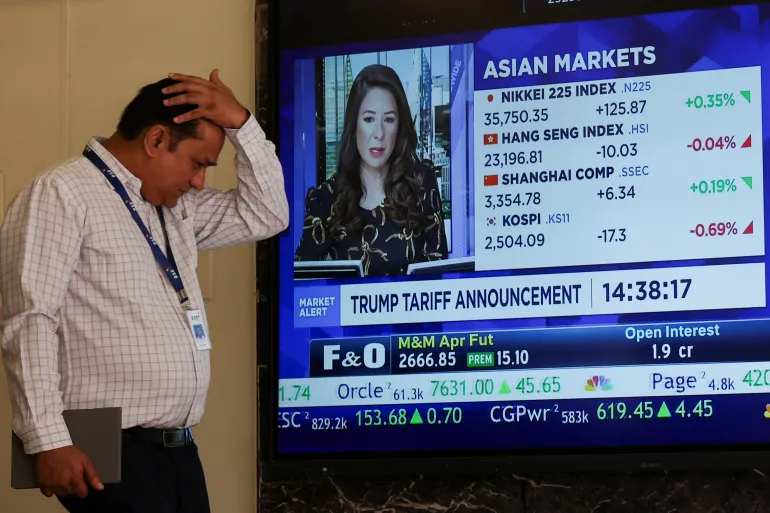
Global Shockwaves as President Trump’s New Tariffs Shake Up U.S. Trade Relations
The United States economy is facing a major shakeup as President Donald Trump announces broad, high-impact tariffs on a range of imported goods. This unprecedented move has sparked international concern and retaliation threats from key allies, with economic analysts warning that these new tariffs could lead to a U.S. and global recession.
Trump’s Tariff Policy: A Turning Point for U.S. Trade
The tariffs, ranging from a baseline 10% to as high as 49%, represent a dramatic shift in the U.S. trade strategy. Despite cautious responses from many of America’s trade partners, the economic reverberations of this move are being felt across global markets.
“This is a game changer for both the U.S. economy and the global economic outlook,” said Olu Sonola, Head of U.S. Economic Research at Fitch Ratings. “Most existing forecasts could be rendered useless if these tariff levels persist.”
Global Response to U.S. Tariff Increases
European Union (EU)
EU President Ursula von der Leyen criticized the 20% U.S. tariff on European goods as a “major blow to the world economy.” She warned of rising costs for essential items like groceries, medicine, and transportation, especially hurting the most vulnerable.
Germany
Chancellor Olaf Scholz called the U.S. tariff decision “fundamentally wrong” and a direct attack on global trade systems that historically benefited America itself.
France, Italy, and Ireland
French PM Francis Bayrou described the tariffs as catastrophic for both Europe and the U.S.. Italian PM Georgia Meloni pushed for diplomatic negotiations to prevent an escalating trade war, while Irish PM Michael Martin labeled the move “deeply regrettable.”
United Kingdom
Despite a 10% U.S. tariff on UK exports, the UK government maintained its stance that the U.S. is its “closest ally.” Business Secretary Jonathan Reynolds emphasized that the UK seeks a trade deal to soften the blow but will defend national interests if needed.
Spain and Sweden
Spain announced a €14.1 billion ($15.6 billion) economic support plan in response to the tariffs, while Sweden’s trade minister Ulf Kristersson emphasized a return to trade collaboration with the U.S.
Finland and Switzerland
Both countries stressed the importance of diplomatic engagement and upholding free trade principles while urging the U.S. to reconsider its aggressive trade stance.
Asian Response: Japan, China, and South Korea
Japan
Facing a 24% U.S. tariff, Japan condemned the move as a violation of WTO rules and their bilateral trade agreement with the U.S., warning of severe damage to its auto industry.
China
Already reeling from a 34% tariff hike, China’s Ministry of Commerce vowed “strong countermeasures” and called on the U.S. to cancel its unilateral trade restrictions. Analysts predict China may retaliate with export controls and even a currency devaluation to cushion economic impacts.
South Korea
In response to a 25% tariff, South Korea’s Acting President ordered emergency support measures and opened direct negotiations with Washington to shield its export-driven economy.
South Asia: India and Sri Lanka
India
India is actively evaluating the tariff impact and seeking “opportunities” amid pressure on its regional competitors. Negotiations for a U.S.-India bilateral trade agreement are already underway.
Sri Lanka
The island nation’s apparel sector, its top export industry, is under threat from a 44% tariff. Industry leaders warned of massive job losses and urged swift engagement with Washington.
Oceania and Latin America React
Australia and New Zealand
Australian PM Anthony Albanese slammed the U.S. decision as lacking logic and harming both countries’ longstanding partnership. New Zealand’s Trade Minister Todd McClay emphasized the importance of free trade and dialogue with the U.S. administration.
Brazil
After a 10% tariff on its exports, Brazil’s government is reviewing retaliatory options and may turn to the World Trade Organization to defend its interests. A new legal framework has been passed to prepare for potential U.S. trade sanctions.
Conclusion: Will Trump’s Tariffs Trigger a Trade War or a New Economic Era?
With countries scrambling to respond to President Trump’s sweeping tariff policy, the world is entering an era of economic uncertainty. While the U.S. administration insists the tariffs are meant to rebalance trade and protect American jobs, global markets fear an escalation into a full-blown trade war.
As America’s closest allies seek diplomatic channels, the coming weeks will be critical in determining whether U.S. trade policy pivots toward cooperation or further confrontation.
SEO Keywords for Maximum Reach:
US tariffs 2025- Trump trade war latest news
- Impact of US tariffs on global economy
- Retaliation against US trade policy
- Tariffs on European goods by USA
- China response to US tariffs
- US economic impact of trade war
- Trump administration tariff hike
- Global trade war 2025
- US allies react to tariffs






